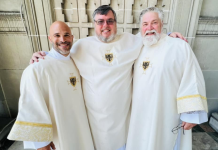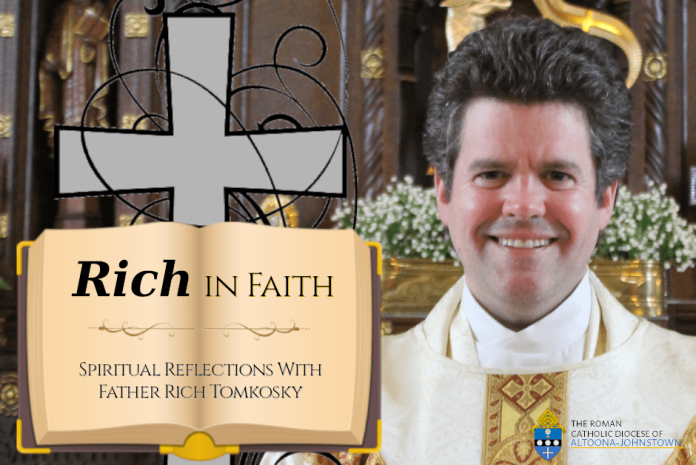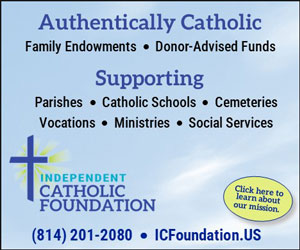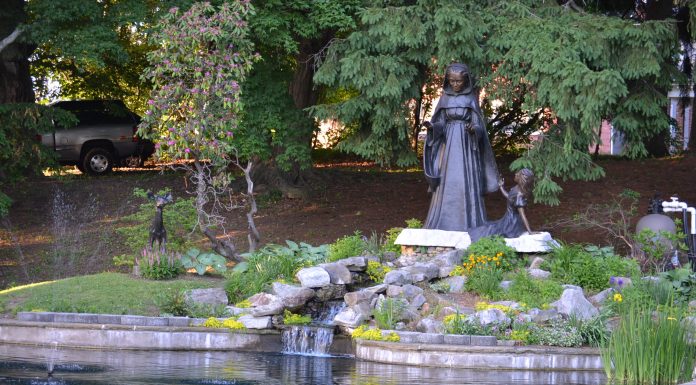By Father Rich Tomkosky
Jesus said in this past Sunday’s Gospel: the path to Heaven is narrow and the path to Hell is wide – not what we human beings want to hear! Jesus gives us some of His hard teachings that caused some of his followers to fall away – then and now. The question for us is as Jesus put it to Saint Peter (Jn 6:67): Are you going to leave me too? But first, let’s look briefly at the readings before the Gospel, which puts Jesus’s teaching in the proper context. The first reading from Sirach tells us, “If you choose, you can keep the commandments, they will save you; if you trust in God, you too shall live. Before man are life and death, good and evil, whichever he chooses shall be given to him. God understands man’s every deed; to none does He give license to sin. The psalmist then tells us: Blessed are they who follow the law of the Lord! And instruct me, O Lord, in the way of your statues, that I may exactly observe them. Give me discernment, that I may observe your law and keep it with all my heart. Finally, Saint Paul says, “We speak a wisdom to those who are mature, not a wisdom of this age. And if we embrace it and live it, we will experience happiness beyond imagining, for truly, eye has not seen, ear has not heard, and it has not entered the human heart what God has prepared for those who love Him. The Holy Spirit has revealed all this — so this leads to Jesus’s direct teachings — they only make sense considering our eternal destiny and that the path to life is narrow. Jesus reminds us that we can’t just pick and choose among His teachings, but we must embrace them all – even the tough ones. As He says, do not think I have come to abolish the law or the prophets, but to fulfill. Whoever breaks one of the least of these commandments and teaches others to do so will be called least in the kingdom of Heaven, and unless your righteousness surpasses that of the Scribes and Pharisees you will not enter the Kingdom of Heaven.
On divorce and re-marriage: It was also said, whoever divorces his wife must give her a bill of divorce, but I say to you, whoever divorces his wife causes her to commit adultery, and whoever marries a divorced woman commits adultery. The qualification of “unless it was unlawful” deals with marrying someone who was too close of a blood relative. This direct teaching of Jesus on marriage is a sign of contradiction to the modern mentality. Many Christians in modern times sadly water down this clear teaching of Jesus as it is a hard teaching. But this clear teaching of Jesus is the reason why the Catholic Church says if we divorce and re-marry without an annulment, we are not allowed to receive the Sacraments until their marriage situation is resolved. First off, a pastoral note: we should pray for everyone in difficult marriage situations, and I as a priest try to help the best I can, but sometimes our hands are tied since we are all bound by the teachings of Jesus. These marriage issues are probably the main reason people fall away from the Catholic Church, and it breaks my heart as a Pastor, but we pray they come back someday and even if someone at present cannot receive the Sacraments because of their marriage situation, one should still come to Mass and participate in the prayers since there are so many graces God gives to one who is making the effort despite some serious obstacles and one can make a spiritual communion. One clarification that many Catholics still misunderstand — if you are divorced but not intimately involved with another person, you are free to receive the Sacraments. It is just like a single person — if you are living a chaste life, you can receive Holy Communion. This is also why if you are divorced you are playing with fire if you start dating another person before you receive an annulment — since until you receive the annulment, you are still married in the eyes of God and the Church, and an annulment is not guaranteed. Is it a good idea to go to Confession after a divorce is finalized? Yes, to receive the healing graces since divorce is always painful, and whatever happened it must be given to the Lord.
What about annulments? Is this the Catholic form of divorce? No, because an annulment declares because of some serious defect based on serious investigation and sworn witness testimony there was never really a sacramental marriage bond to begin with. It deals with the beginning of the marriage when you took your vows before God: deception, inability to make a permanent commitment, grave immaturity, not being open to having children or putting a firm limit on how many children would be born to the union instead of being fully open to God’s will; drug or alcohol problems from the very start of the marriage, other serious psychological problems, not willing to remain faithful for life, etc. Do the children become illegitimate? No, because a declaration of nullity doesn’t mean a marriage did not occur. The civil effects are all still there, including obligations to offspring, alimony, and visitation – it is just that it didn’t meet the sacramental marriage criteria of the Faith upon investigation. Do you have to pay a lot of money to get one? In our diocese it is free. Do non-Catholics need one? If they want to marry a Catholic. An annulment is a decision of the Catholic Church which is given the power by Jesus himself to “bind and loose,” to decree based on concrete evidence, hence the need for a few witnesses to verify what the annulment petitioner is saying: that a marriage did not meet the requirements of a sacramental union. Some will say that they don’t believe in annulments. Well, we can’t be “more Catholic” than the Church. And annulments have always been issued by the Church; they are just more common today because sadly there are more broken marriages today than ever in history. If you are divorced or have taken the step on getting re-married civilly and as a result currently cannot receive the Sacraments, unless you are willing to live as brother and sister, please contact your priest, so we can hopefully counsel you and help you to start the process for a potential annulment. Yes, it is painful to re-visit the past, but it is also good to bring some closure to it and healing in God, especially if one has been away from the Sacraments because of a marriage situation. The last word I want to mention on this topic is for Catholics who were married and now are divorced or re-married to someone else: if the Catholic Church never blessed the first marriage, then it may be a very easy process of getting things right. This is called a lack of canonical form case and what that means in practical language is: the marriage was never recognized by the Catholic Church because Catholics are bound by canon law to have a priest or a deacon bless their marriage or have permission from the Bishop to have a non-Catholic minister preside at their wedding. If that didn’t happen, then by a sworn statement by the Catholic party and two witnesses and some documentary proof, the Church can officially say it didn’t meet the criteria of a sacramental marriage, and so one would be free to be married in the Catholic Church again. It is a much shorter process than an annulment because it is a clear-cut case based on documentary evidence. If you have any other questions, please contact me for help. God bless you.
Father Rich Tomkosky is the Pastor of Saint Thomas the Apostle Parish in Bedford and the Pastor of Seven Dolors of the Blessed Virgin Mary Parish in Beans Cove.





























